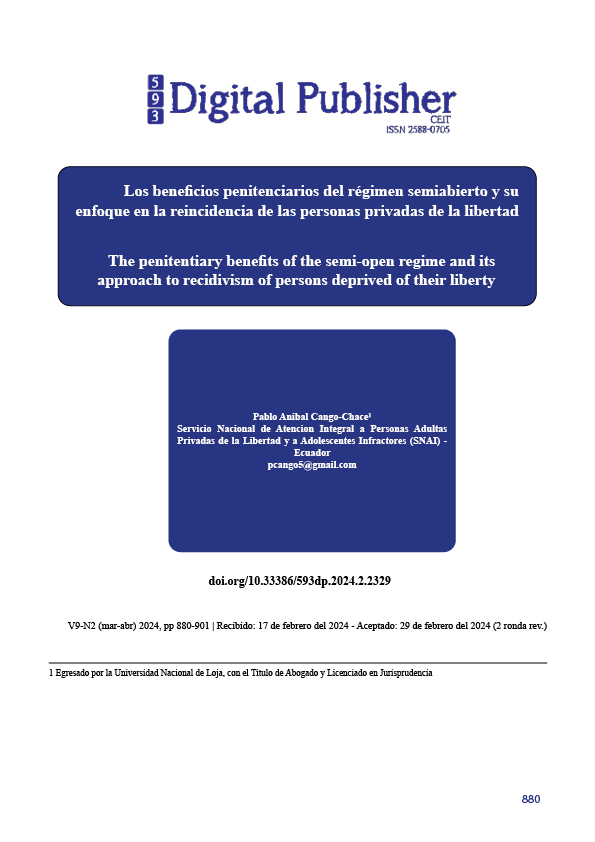The penitentiary benefits of the semi-open regime and its approach to recidivism of persons deprived of their liberty
Main Article Content
Abstract
Ecuador, being considered as a Constitutional State of Rights and Justice, embodied in the Constitution of the Republic of Ecuador of 2008, clearly defines the rights, obligations and benefits that all persons living in the same State have, among them we have persons deprived of liberty, as a vulnerable group, subject to rights, obligations and even prison benefits.
Prison benefits are constitutional rights for persons deprived of liberty, where the Ecuadorian criminal justice system grants to this group considered vulnerable, who, with the support of the National System of Social Rehabilitation, seek its sole purpose, which is an effective and progressive Social Rehabilitation, with a view to an effective social reintegration into society. However, the reality is that the penitentiary benefits have not taken the desired course, in their search for the prisoner to fulfill his social reintegration process.
Downloads
Article Details

This work is licensed under a Creative Commons Attribution-NonCommercial-ShareAlike 4.0 International License.
1. Derechos de autor
Las obras que se publican en 593 Digital Publisher CEIT están sujetas a los siguientes términos:
1.1. 593 Digital Publisher CEIT, conserva los derechos patrimoniales (copyright) de las obras publicadas, favorece y permite la reutilización de las mismas bajo la licencia Licencia Creative Commons 4.0 de Reconocimiento-NoComercial-CompartirIgual 4.0, por lo cual se pueden copiar, usar, difundir, transmitir y exponer públicamente, siempre que:
1.1.a. Se cite la autoría y fuente original de su publicación (revista, editorial, URL).
1.1.b. No se usen para fines comerciales u onerosos.
1.1.c. Se mencione la existencia y especificaciones de esta licencia de uso.
References
Barragan, C. (2009). Derecho Procesal Penal. The McGrave-Hill Companies.
Cabrera, J. (2016). Personas Privadas de la Libertad, Sistema Integral de Rehabilitacon y su Incidencia en la Reinsercion Social [Tesis de Grado]. Repositorio Institucional.
Castro, M. (2018). El regimen semiabierto como beneficio de los privados de la libertad [Tesis de Maestria]. Universidad Andina Simon Bolivar, sede Ecuador, Ecuador. Obtenido de http://hdl.handle.net/10644/6385
Codigo Organico Integral Penal. (10 de Febrero de 2014). Registro Oficial No. 180. Quito, Ecuador: Asamblea Nacional del Ecuador.
Codigo Penal de Honduras. (23 de agosto de 1983). Decreto Numero 144-83. Tegucigalpa, Honduras: Congreso Nacional.
Constitución de la República del Ecuador. (20 de Octubre de 2008). Registro Oficial No. 449 , 20 de Octubre 2008. Quito , Ecuador : Asamblea Nacional del Ecuador .
Defensoria Publica del Ecuador. (2022). Beneficios Penitenciarios Defensa Judicial. Gestion de la Defensoria Publica. Pichincha: Biblioteca Defensoria Publica. Obtenido de https://biblioteca.defensoria.gob.ec/bitstream/37000/3808/1/Instructivo%20de%20beneficios%20penitenciarios.%20Defensa%20Judicial.pdf
El Universo. (5 de Agosto de 2022). Seguridad: Delicuencia. (A. Alejandro, Editor) Obtenido de https://www.eluniverso.com/noticias/seguridad/asi-estan-las-cifras-de-la-inseguridad-en-el-primer-semestre-del-2022-comparadas-con-los-tres-anos-previos-nota/
Fiscalía General del Estado Analitica. (08 de Septiembre de 2023). Cifras de Robo. Obtenido de Fiscalia General del Estado: https://www.fiscalia.gob.ec/analitica-cifras-de-robo/
Goldstein, R. (2015). Diccionario de Derecho Penal y Criminologia. Buenos Aires: UCBSP.
Gonzalez, B. (2023). Registros Administrativos de Beneficios Penitenciarios [Figura]. Reinsercion Social Loja 1. Loja: Centro de Privacion de Libertad Loja 1.
Gonzalez, B. (2023). Registros Administrativos de Beneficios Penitenciarios [Tabla]. Loja: Centro de Privacion de Libertad.
Infractores, S. N. (2020). Nueva Tipologia del Sistema de Rehabilitacion Social. SNAI, Quito, Ecuador. Obtenido de https://www.atencionintegral.gob.ec/wp-content/uploads/2022/01/DIVISION-ZONAL-SNAI1.pdf
Machado, M., Hernandez, E., Inga, M., & Tixi, D. (15 de 11 de 2019). La certificación de actividades laborales como proceso rehabilitacion de los privados de la libertad en el Centro de Rehabilitacion Social de Chimborazo. Uniandes EPISTEME, 6 (Especial), 861.
Meini, I. (2013). La pena: funcion y presupuestos. Fondo Editorial de la Pontificia Universidad Catolica del Peru, 142.
Ministerio de Justicia e Interior. (2022, 03 de mayo). Reglamento Penitenciario. Madrid, España: BOE.
Moreno, L. (14 de 11 de 2018). Decreto Ejecutivo Nro. 560. 11. Quito, Ecuador: Palacio Nacional. Obtenido de https://www.igualdadgenero.gob.ec/wp-content/uploads/2018/12/Decreto-Ejecutivo-Nro.-560.pdf
Rivera, I. (2009). La cuestion carcelaria. Avelleneda, Argentina: Editores del Pueblo e.r.l.
Rivero, M. (1982). El Codigo de Hammurabi. Clio. History and history teaching, 7, 1.
Rojas, J. C. (2021). Reflexiones de Politica Publica sobre Cumplimiento Tributario y Compliance Tributario en Colombia [Tesis Doctoral, Universidad de Salamanca]. Repositorio Institucional. Obtenido de https://gredos.usal.es/bitstream/handle/10366/148418/PDEDGG_RojasAriasJC_Pol%C3%ADticap%C3%BAblica.pdf?sequence=1&isAllowed=y
Sala Plena de la Corte Constitucional. (1998). Sentencia T-583/98. Obtenido de https://www.corteconstitucional.gov.co/relatoria/1998/t-583-98.htm
Sammara, J. (2017). La evolucion de los fundamentos de las penas y el surgimiento de politicas actuariales basadas en la sociedad del riesgo. Revista de Derecho, Escuela de Postgrado(9), 62-90.
Santillan, S. (2021). Determinar un indice de criminalidad para Ecuador periodo 2017-2020 [Tesis de Titulacion, Universidad Central del Ecuador]. Repositorio Institucional.
Servicio Nacional de Atencion Integral a Personas Adultas Privadas de la Libertad y a Adolescentes Infractores. (30 de 07 de 2020). Reglamento del Sistema de Rehabilitacion Social. Resolución Nro. SNAI-SNAI-2020-0031-R. Quito, Ecuador: Registro Oficial.
UNODC. (julio de 2020). Prevencion del delito y justicia penal. Obtenido de Oficina de las Naciones Unidas contra la Droga y el Delito: https://www.unodc.org/e4j/es/tertiary/criminal-justice.html



